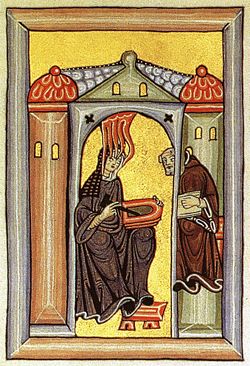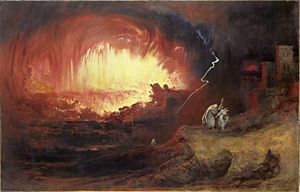Hippolytus and His Teachings
Monday, August 13th, 2012
An Originally Female Statue Transformed to Allegedly Represent Hippolytus (found in 1551)
August 13th is the date that Catholics of Rome set apart to honor Hippolytus of Rome (the Eastern Orthodox use January 30). He was a Bishop of Rome in the third century.
Although known as the first “antipope,” The Catholic Encyclopedia claims that Hippolytus is a Catholic saint and was “the most important theologian…of the Roman Church in the pre-Constantinian era” (Kirsch, Johann Peter. “St. Hippolytus of Rome.” The Catholic Encyclopedia. Vol. 7. New York: Robert Appleton Company, 1910. 18 Jul. 2012 <http://www.newadvent.org/cathen/07360c.htm>).
Despite being a Catholic saint and important theologian, Hippolytus apparently held a binitarian, not trinitarian, view of the Godhead:
He did not say, “I and the Father am one, but are one.” For the word are is not said of one person, but it refers to two persons, and one power…(Hippolytus. Against Noetus: Against the Heresy of One Noetus, Chapter 7. from The Extant Works and Fragments of Hippolytus: Dogmatical and Historical. Roberts-Donaldson English Translators. Copyright © 2001 Peter Kirby)
Hippolytus also taught that God has a 6000-7000 year plan, like those of us in the genuine Church of God do (see Does God Have a 6,000-7,000 Year Plan?):
And 6,000 years must needs be accomplished, in order that the Sabbath may come, the rest, the holy day “on which God rested from all His works.” For the Sabbath is the type and emblem of the future kingdom of the saints, when they “shall reign with Christ,” when He comes from heaven, as John says in his Apocalypse: for “a day with the Lord is as a thousand years. “Since, then, in six days God made all things”, it follows that 6,000 years must be fulfilled. (Hippolytus. On the HexaËmeron, Or Six Days’ Work. From Fragments from Commentaries on Various Books of Scripture. http://www.newadvent.org/fathers/0502.htm viewed 9/17/07)
Hippolytus thus taught the 7,000 year plan (6,000 for humankind, followed by 1,000 from God).
Hippolytus also noted that in the third century celibacy was not required for the clergy (and not by his rival, Roman Bishop Callistus) including bishops, and he condemned this:
About the time of this man, bishops, priests, and deacons, who had been twice married, and thrice married, began to be allowed to retain their place among the clergy. (Hippolytus. Refutation of All Heresies, Book IX, Chapter VII. Excerpted from Ante-Nicene Fathers, Volume 5. Edited by Alexander Roberts & James Donaldson. American Edition, 1886)
The Catholic Encyclopedia teaches that the 3rd century Bishop of Rome, “Callistus allowed the lower clergy to marry.” (Chapman J. Transcribed by Benjamin F. Hull. Pope Callistus I. The Catholic Encyclopedia, Volume III. Published 1908. New York: Robert Appleton Company. Nihil Obstat, November 1, 1908. Remy Lafort, S.T.D., Censor. Imprimatur. +John Cardinal Farley, Archbishop of New York).
Hippolytus also wrote about idol or icon makers:
If someone is a sculptor or a painter, let them be taught not to make idols. Either let them cease or let them be rejected. (Hippolytus. The Apostolic Tradition of Hippolytus of Rome, Chapter 16, Verse 3)
Idols and icons were not even part of the early worship practices of the Church of Rome (see also What Did the Early Church Teach About Idols and Icons?).
Hippolytus noted:
That it is not meet for Christians to bear arms…(Hippolytus. Heads of the Canons of Abulides or Hippolytus, Which Are Used by the Ethiopian Christians. Excerpted from Ante-Nicene Fathers, Volume 5. Edited by Alexander Roberts & James Donaldson. American Edition, 1886.)
16:6 A charioteer, likewise, or one who takes part in the games, or one who goes to the games, he shall cease or he shall be rejected. 7 If someone is a gladiator, or one who teaches those among the gladiators how to fight, or a hunter who is in the wild beast shows in the arena, or a public official who is concerned with gladiator shows, either he shall cease, or he shall be rejected. 8 If someone is a priest of idols, or an attendant of idols, he shall cease or he shall be rejected. 9 A military man in authority must not execute men. If he is ordered, he must not carry it out. Nor must he take military oath. If he refuses, he shall be rejected. 10 If someone is a military governor, or the ruler of a city who wears the purple, he shall cease or he shall be rejected. 11 The catechumen or faithful who wants to become a soldier is to be rejected, for he has despised God. (Hippolytus. The Apostolic Tradition of Hippolytus of Rome. From the work of Bernard Botte (La Tradition Apostolique. Sources Chretiennes, 11 bis. Paris, Editions du Cerf, 1984) and of Gregory Dix (The Treatise on the Apostolic Tradition of St. Hippolytus of Rome, Bishop and Martyr. London: Alban Press, 1992) as translated by Kevin P. Edgecomb http://www.bombaxo.com/hippolytus.html viewed 08/06/09)
All legitimate scholars realize that until the late third/early fourth centuries, even Greco-Roman professors of Christ were generally opposed to Christians being in the military (for more information, please see Military Service and the Churches of God: Do Real Christians Participate in Carnal Warfare?).
Hippolytus wrote the following about Zephyrinus (who is believed to have been Bishop of Rome from 199-217):
Zephyrinus, an ignorant and illiterate individual, and one unskilled in ecclesiastical definitions. (Hippolytus. Refutation of All Heresies, Book IX, Chapter VI)
Perhaps it should be noted that Callistus (Bishop of Rome from 217-222) was considered to have been corrupt. Callistus was condemned by Hippolytus for his corruption, allowing abortion/infanticide, and for instituting a Saturday fast.
In circa 217 A.D., Callistus became bishop of Rome and somehow succeeded Zephyrinus. After he did, as Hippolytus reports, Callistus lowered standards and many who professed Christ liked that:
Callistus…a man cunning in wickedness, and subtle where deceit was concerned, (and) who was impelled by restless ambition to mount the episcopal throne. Now this man moulded to his purpose Zephyrinus, an ignorant and illiterate individual, and one unskilled in ecclesiastical definitions. And inasmuch as Zephyrinus was accessible to bribes, and covetous, Callistus, by luring him through presents, and by illicit demands, was enabled to seduce him into whatever course of action he pleased. And so it was that Callistus succeeded in inducing Zephyrinus to create continually disturbances among the brethren, while he himself took care subsequently, by knavish words, to attach both factions in good-will to himself. (Hippolytus. Refutation of All Heresies, Book IX, Chapter VI)
The impostor Callistus … And the hearers of Callistus being delighted with his tenets, continue with him, thus mocking both themselves as well as many others, and crowds of these dupes stream together into his school. Wherefore also his pupils are multiplied, and they plume themselves upon the crowds (attending the school) for the sake of pleasures which Christ did not permit. But in contempt of Him, they place restraint on the commission of no sin, alleging that they pardon those who acquiesce (in Callistus’ opinions). For even also he permitted females, if they were unwedded, and burned with passion at an age at all events unbecoming, or if they were not disposed to overturn their own dignity through a legal marriage, that they might have whomsoever they would choose as a bedfellow, whether a slave or free, and that a woman, though not legally married, might consider such a companion as a husband. Whence women, reputed believers, began to resort to drugs for producing sterility, and to gird themselves round, so to expel what was being conceived on account of their not wishing to have a child either by a slave or by any paltry fellow, for the sake of their family and excessive wealth. Behold, into how great impiety that lawless one has proceeded, by inculcating adultery and murder at the same time! And withal, after such audacious acts, they, lost to all shame, attempt to call themselves a Catholic Church! And some, under the supposition that they will attain prosperity, concur with them. (Hippolytus. Refutation of All Heresies, Book IX, Chapter VII)
Notice that Callistus’ allowance of biblically condemned sin led to an increase in Roman Church attendance, and that Callistus allowed (or at least permited) abortion and adultery. Callistus apparently thus caused many pagans to become part of the Church of Rome.
Note that even The Catholic Encyclopedia admitted this about Callistus and Zephyrinus:
Callistus…Our chief knowledge of this pope is from his bitter enemies…He obtained great influence over the ignorant, illiterate, and grasping Zephyrinus by bribes. We are not told how it came about that the runaway slave (now free by Roman law from his master, who had lost his rights when Callistus was condemned to penal servitude to the State) became archdeacon and then pope…Again Callistus…permitted noble ladies to marry low persons and slaves, which by the Roman law was forbidden; he had thus given occasion for infanticide. (Chapman , Pope Callistus I)
Here is Hippolytus’ condemnation of Callistus’ Sabbath fast:
Even today some allow themselves the same audacities: they order fasting on the Sabbath of which Christ has not spoken, dishonoring even the Gospel of Christ. (Hippolytus. In Danielem commentarius, 4, 20, 3 as Cited in Bacchiocchi Anti-Judaism and the Origin of Sunday, p. 65)
Hippolytus also wrote about nude baptism, which apparently was a practice in Alexandria, and possibly for a while in Rome. But neither the Alexandrian Orthodox nor Roman Catholics currently teach that.
Despite having some views consistent with genuine Church of God positions, Hippolytus condemned others. Notice some complaints from Hippolytus concerning beliefs of those he considered to be heretics:
…a passover of the Lord God kept unto our generations, by those who are able to discern (this mystery), at the commencement of the fourteenth day…
And certain other (heretics), contentious by nature, (and) wholly uniformed as regards knowledge, as well as in their manner more (than usually) quarrelsome, combine (in maintaining) that Easter {Passover} should be kept on the fourteenth day of the first month, according to the commandment of the law, on whatever day (of the week) it should occur. (But in this) they only regard what has been written in the law, that he will be accursed who does not so keep (the commandment) as it is enjoined… In other respects, however, these consent to all the traditions delivered to the Church by the Apostles. ( Hippolytus. Refutation of All Heresies, Book 8, Chapters 7 and 11)
So sadly, Hippolytus of Rome clearly is condemning the views and practices of those who kept Passover on the 14th as heretical (a term he referred to them as in the verse that followed the one above), even though he seemingly otherwise considers them to be faithful.
Hippolytus also wrote about Simon Magus (Simon Magus, What Did He Teach?), prophetic matters (When Will the Great Tribulation Begin?, Some Doctrines of Antichrist, and Who Are The Two Witnesses?) and is one who also attempted to put together the locations that the original apostles went to (see Location of the Early Church: Another Look at Ephesus, Smyrna, and Rome).
Yet, while he was not truly part of the genuine Church of God, his writings show that many practices that the Church of Rome and the Eastern Orthodox now hold were simply not even the practices of those churches in the third century. They changed, but the genuine Church of God has not.
Some articles of possibly related interest may include:
Hippolytus of Rome A third century Catholic saint and one elected to be Bishop of Rome who condemned others for taking bribes and allowing abortions. Why was he considered to be the first antipope?
The History of Early Christianity Are you aware that what most people believe is not what truly happened to the true Christian church? Do you know where the early church was based? Do you know what were the doctrines of the early church? Is your faith really based upon the truth or compromise?
The Churches of Revelation 2 & 3 Do they matter? Most say they must, but act like they do not. This article contains some history about the Church of God (sometimes referred to as the continuation of Primitive Christianity) over the past 2000 years. It also discusses the concept of church eras.
What Do Roman Catholic Scholars Actually Teach About Early Church History? Although most believe that the Roman Catholic Church history teaches an unbroken line of succession of bishops beginning with Peter, with stories about most of them, Roman Catholic scholars know the truth of this matter. This eye-opening article is a must-read for any who really wants to know what Roman Catholic history actually admits about the early church.
Nazarene Christianity: Were the Original Christians Nazarenes? Should Christians be Nazarenes today? What were the practices of the Nazarenes.
Location of the Early Church: Another Look at Ephesus, Smyrna, and Rome What actually happened to the primitive Church? And did the Bible tell about this in advance?
Apostolic Succession What really happened? Did structure and beliefs change? Are many of the widely-held current understandings of this even possible? Did you know that Catholic scholars really do not believe that several of the claimed “apostolic sees” of the Orthodox have apostolic succession–despite the fact that the current pontiff himself seems to wish to ignore this view? Is there actually a true church that has ties to any of the apostles that is not part of the Catholic or Orthodox churches? Read this article if you truly are interested in the truth on this matter!
Early Church History: Who Were the Two Major Groups Professed Christ in the Second and Third Centuries? Did you know that many in the second and third centuries felt that there were two major, and separate, professing Christian groups in the second century, but that those in the majority churches tend to now blend the groups together and claim “saints” from both? “Saints” that condemn some of their current beliefs. Who are the two groups?
Which Is Faithful: The Roman Catholic Church or the Genuine Church of God? Do you know that both groups shared a lot of the earliest teachings? Do you know which church changed? Do you know which group is most faithful to the teachings of the apostolic church? Which group best represents true Christianity? This documented article answers those questions. Português: Qual é fiel: A igreja católica romana ou a verdadeira igreja do deus? Tambien Español: ¿Que es fiel: La Iglesia Católica Romana o la Iglesia verdadera de Dios? Auch: Deutsch: Welches ist treu: Die römisch-katholische Kirche oder die Kirche Gottes Original?
Some Similarities and Differences Between the Eastern Orthodox Church and the Genuine Church of God Both groups claim to be the original church, but both groups have differing ways to claim it. Both groups have some amazing similarities and some major differences. Do you know what they are?
Binitarian View: One God, Two Beings Before the Beginning Is binitarianism the correct position? What about unitarianism or trinitarianism?
Did the True Church Ever Teach a Trinity? Most act like this is so, but is it?
Was Celibacy Required for Early Bishops or Presbyters? Some religions suggest this, but what does the Bible teach? What was the practice of the early church?
Did The Early Church Teach Millenarianism? Was the millennium (sometimes called chiliasm) taught by early Christians? Who condemned it? Will Jesus literally reign for 1000 years on the earth? Is this time near?
Does God Have a 6,000-7,000 Year Plan? What Year Does the 6,000 Years End? Was a 6000 year time allowed for humans to rule followed by a literal thousand year reign of Christ on Earth taught by the early Christians? Does God have 7,000 year plan? What year may the six thousand years of human rule end? When will Jesus return? 2019 or 202x?
Did Real Christians Practice Nude Baptism? This is not a joke. Find out what was taught in the second and later centuries.
What Did the Early Church Teach About Idols and Icons? What about the use of the cross, by the early Church?
Military Service and the Churches of God: Do Real Christians Participate in Carnal Warfare? Here are current and historical perspectives on a matter which show the beliefs of the true church on military participation. Is war proper for Christians?
“Pope” Zephyrinus (199-217) He was the first bishop publicly accused of accepting bribes (and this was by one now recognized as a saint by Roman Catholics). He refused to condemn the Montanists and seemed to have had a confused view of the Godhead.
“Pope” Callistus (217-222) He is the first bishop known to have been a criminal prior to his election. He was also accused of a variety of corrupt acts, including allowing indulgences and infanticide (abortion).
Passover and the Early Church Did the early Christians observe Passover? What did Jesus and Paul teach? Why did Jesus die for our sins?











